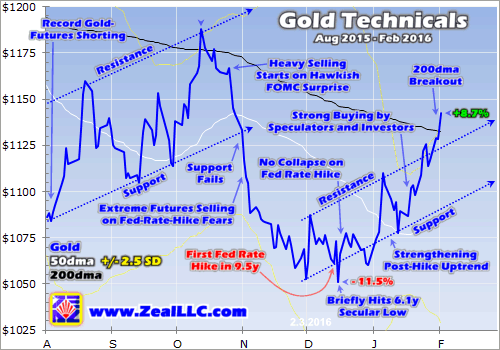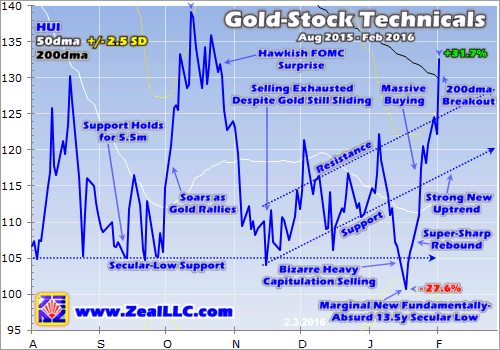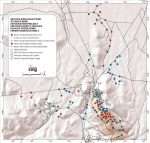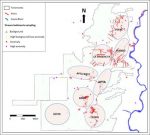
Gold and its miners’ stocks are rocketing higher as speculators and investors alike return to this left-for-dead sector. This sudden deluge of capital inflows has crowned gold stocks the best-performing sector of this young new year by far, shocking traders. And this stunning reversal of fortunes in both the metal and the companies producing it is only starting, so it’s exceedingly important to understand what’s going on.
Gold was inarguably the world’s most-hated investment in recent years. No one wanted anything to do with it, because no one felt any need for it. The world’s stock markets were relentlessly levitating, thanks to record easing by the world’s elite central banks. And with stocks seemingly destined to do nothing but rally indefinitely, there was little demand for counter-moving gold for prudent portfolio diversification.
But as global stock markets started sliding in 2016, the bubble in central-bank confidence rapidly started to burst. Central banks indeed quickly stepped in to try and stave off the waves of selling, but to no avail. Extreme central-bank jawboning and actions that would’ve dramatically goosed stocks in years past failed to have much impact, helping shake traders awake from their years-long central-bank-induced stupor.
These newly-alert traders started remembering that markets are forever cyclical, they can’t move in a straight line forever. What’s high and in favor after rallying for years will inevitably roll over and head the other way, a bearish portent for central-bank-levitated stocks. Conversely what’s low and out of favor after years of selling will inevitably mean revert higher. Thus investment demand for gold is rekindling.
The dazzling 2016 gold story truly is that simple. Stock markets are rolling over into a long-overdue new cyclical bear that central banks artificially held at bay for years. So investors are diversifying into gold, which generally moves counter to stocks. And with investors migrating back, speculators are flocking in as well to ride gold’s momentum. With this strategic context in place, let’s dig into what’s been moving gold.

The recent seeds for 2016’s new gold upleg were sown late last July. Years of central-bank-levitated stock markets had left gold with major secular support between $1150 and $1200. As gold slumped to the lower end of that zone in its usual summer doldrums, a large bearish speculator decided to press his bets in spectacular fashion late one lazy Sunday evening in July in a record gold-futures shorting attack.
Within one minute around 9:30pm, nearly 24k gold-futures contracts controlling about $2.7b worth of gold were sold short! This brazen attempt to shatter gold’s support worked, blasting it almost $50 lower in that single minute. With $1150 broken, gold would drift down near $1084 by early August. But with bearish futures speculators’ selling exhausted, gold rebounded sharply in what would become a multi-month uptrend.
The American futures speculators who dominantly manhandled gold in 2015 had been overwhelmingly bearish on the yellow metal. Their core thesis was very simple. Since gold yields nothing, the coming Fed rate hikes would decimate investment demand for this metal. Higher yields in bonds would make zero-yielding gold even less attractive, and the resulting capital flight would smash gold way under $1000.
The Fed’s Federal Open Market Committee meeting in late October played right into this bearish-gold outlook. The very morning of that decision, gold was trading near $1182 and had more than recovered its record-shorting-attack losses. But the FOMC surprised that day coming across as very hawkish, by declaring it might very well hike rates for the first time in a decade at its next meeting coming in mid-December.
So American futures speculators dumped gold with a vengeance, at rates so extreme several major new all-time records for gold-futures selling were hit. That frenzied gold-futures selling petered out by early December, with gold pounded back down near $1053. There were almost no gold bulls left, with even those who called themselves bulls universally predicting another drop down into the $800s before gold bottomed.
But for a handful of contrarian students of the markets including me, this was supremely irrational. Gold too is forever cyclical, its price can’t fall forever. And with literally everyone hyper-bearish on this metal and utterly convinced it was doomed to keep spiraling lower indefinitely, peak fear had to be near. When a trade gets that epically one-sided, everyone susceptible to being scared into selling low has already sold.
And the seemingly-logical core case for this extreme gold bearishness, that a new Fed-rate-hike cycle would devastate zero-yielding gold, was totally false historically! I started researching gold’s behavior during past Fed-rate-hike cycles last summer. If higher rates indeed suck capital out of gold, that would be crystal-clear in the historical record. Surely the gold-futures speculators had done their homework, right?
It turns out there have been 11 Fed-rate-hike cycles since 1971, a large sample size over many decades. On average during the exact spans of all 11, gold rallied 26.9%. In the 6 where gold climbed, its average gains were a staggering 61.0%! And in the other 5 where gold retreated, its average losses proved to be an asymmetrically-small 13.9%. Historically Fed-rate-hike cycles were actually exceedingly bullish for gold!
The lower the gold price when a Fed-rate-hike cycle is launched, and the more gradual that cycle’s hiking, the bigger gold’s gains within it. With the Fed’s imminent rate-hike cycle coming with gold near major secular lows, and promised to be the most gradual ever, it was hard to imagine a more bullish scenario for gold. Yet the goofy futures speculators were so caught up in their masturbatory groupthink they were blind.
These traders make mind-bogglingly-risky hyper-leveraged bets where they can double or lose all their capital with a mere few-percent move in gold. They can’t afford to trade on bad information. Yet they didn’t even remember that gold soared 50% higher during the last rate-hike cycle between June 2004 to June 2006, where the Fed more than quintupled its federal-funds rate to 5.25% through 17 consecutive hikes.
Believe me, I didn’t keep this critical research to myself. I originally published it in an essay back in early September, and deepened it considerably in mid-December just days before that FOMC meeting. I did everything I could to alert investors and speculators to the epic contrarian opportunity in gold, and was ignored, mocked, and ridiculed for it. People hate hearing when they are wrong for succumbing to groupthink.
The Fed indeed hiked rates for the first time in 9.5 years in mid-December, the very event that American futures speculators had long been waiting for to crush gold. And the next day gold indeed suffered a kneejerk plunge, falling 2.1% to a marginal new 6.1-year secular low of $1051. But in the subsequent days leading into year-end, gold didn’t collapse. That was a massive clue consensus was dead wrong.
On New Year’s Eve when gold remained loathed and closed at $1060, I published an essay “Fueling Gold’s 2016 Upleg”. In it I explained why “gold is poised for a mighty upleg in 2016”. Speculators had to do vast gold-futures buying to mean revert their excessively-bearish bets back to normal levels, and investors had to do vast gold buying to mean revert their own meager gold portfolio holdings to normal levels as well.
And that’s indeed coming to pass already, just as I advised investors it would. During the first 4 weeks of 2016 for gold-futures speculators, they boosted their long holdings by 22.3k contracts while slashing their shorts by 22.2k. That’s the equivalent of 138.4 metric tons of gold buying from this group of traders alone! And these guys still have another 163.3k contracts or 507.9t left to buy to fully mean revert to normal.
To put this into perspective, the World Gold Council reports that global gold investment demand during the first 9 months of 2015 (latest data) averaged 76.0t per month. Meanwhile on the investment front, American stock investors have already put so much differential buying pressure on GLD gold-ETF shares that its gold-bullion holdings have surged 47.7t or 7.4% higher so far this year! Gold demand is really back.
But how can this be when gold yields nothing? Why do investors flock to it during Fed-rate-hike cycles? The answer is simple. A tightening Fed is the arch-nemesis of stock markets levitated for years by epic record Fed easing. As Fed-inflated stock prices crumble into a new cyclical bear, smart investors have no choice but to diversify their portfolios. And gold has been the premier portfolio diversifier for millennia.
This investment gold buying is only just starting, as is the powerful new gold upleg it is driving. Late last year, American stock investors had just 0.115% of their portfolios invested in gold per the ratio between the value of GLD’s holdings and the S&P 500’s collective market capitalization. Between 2009 and 2012 before the Fed’s third quantitative-easing campaign radically distorted markets, that was 4.1x higher at 0.475%!
There’s no doubt this new stock bear as the Fed’s gross distortions unwind will easily push this ratio back over 0.5% in the next year or two. And that’s going to require vast gold buying by American stock investors alone. During 2012 before QE3, GLD’s holdings averaged 1294.2t which is another 88% higher from this week’s levels. That gold investment helped support gold’s average price of $1669 in 2012.
Just as stock-market-investment cycles take years to unfold, so do gold-investment cycles. So realize the gold buying and resulting rallying we’ve seen so far in 2016 is just the tiniest tip of the iceberg. Gold is not only going to fully mean revert out of recent years’ extreme central-bank distortions, but overshoot towards the opposite extreme. We are truly looking at gold rallying on balance for years as investors return!
Investors can ride this great mean reversion back to normal gold-investment levels with physical gold bullion or the flagship GLD SPDR Gold Shares gold ETF. Speculators can buy call options on the latter. Gold is conservative and rallies during stock bears, which is far superior to cash. But if you really want to multiply wealth as gold mean reverts higher, the gold miners’ stocks will greatly amplify gold’s coming gains.

The gold stocks are ultimately just a leveraged play on gold prices. Since their mining costs are largely fixed when mines are built, the price of gold overwhelmingly determines the profitability of mining it. And stock prices always eventually gravitate towards some reasonable multiple of the earnings of their underlying companies. Since rising gold prices lead to exploding mining profits, gold-mining stocks skyrocket.
Let’s backtrack and get some perspective here, just like in gold. Last July’s record gold-futures shorting attack pounded the premier gold-stock index, the HUI NYSE Arca Gold BUGS Index, to a brutal 13.0-year secular low. If you think sentiment in gold was bad, it was practically rapturous compared to the dark hell gold stocks have suffered through! Everyone, and I mean literally everyone, viscerally loathed this sector.
But such gold-stock price levels were fundamentally-absurd, as I argued aggressively in late July, again in mid-November, and a third time in late January. Trading near 105 per the HUI, the gold stocks languished at levels last seen in July 2002 when gold was trading near $305 and had yet to exceed $329 in its young secular bull. Yet even at gold’s deep post-rate-hike low near $1050, it was 3.4x higher than that.
The elite gold miners’ stocks are all included in the HUI as well as the GDX Market Vectors Gold Miners ETF. Per the latest full quarterly data available which is Q3’s, these leading gold miners had average all-in sustaining costs of $866 per ounce. In other words, they can produce gold and do all the exploration, mine building, and reclamation necessary to sustain those levels of gold production indefinitely for $866.
I wrote a whole comprehensive essay detailing the gold miners’ costs in mid-November, and will likely do another one soon incorporating Q4 data. But when an entire industry can mine gold at essentially a $200-per-ounce profit near recent gold lows, does it make any sense at all for the gold stocks to trade as if gold was just over $300? Those gold-stock prices were ludicrous, truly fundamentally-absurd by any standard.
So even as gold drifted lower after that initial HUI 105 print in early August, the gold stocks held strong. With this industry priced as if it would cease to exist within weeks, everyone susceptible to being scared into selling low had already sold. This selling exhaustion gave way to a monster rally in early October as gold caught a bid, but that was quickly scuttled after gold plummeted in the wake of that hawkish FOMC surprise.
While gold plumbed dismal new secular lows in November and December, the gold stocks’ key support at HUI 105 held. The left-for-dead gold stocks had actually started to carve a new upleg way back in mid-November, which held strong despite gold’s new post-rate-hike secular low in mid-December. As 2015 waned, I argued that gold stocks would be the best-performing sector of 2016 by far as they mean reverted.
This entire sector couldn’t trade as if gold was $300 when it was earning profits on the order of $200 per ounce even not far above $1050 gold! Since gold drives gold-mining profits, and profits ultimately drive stock prices, reasonable gold-stock price levels can be approximated through the HUI/Gold Ratio. And that declared the gold stocks’ prices needed to quadruple merely to reflect then-prevailing low gold prices!
And indeed the last time gold had hit those mid-December lows near $1050 back in October 2009, the HUI had been trading near 390 instead of 106. I’ve been writing about this extreme gold-stock pricing anomaly for months on end, and aggressively buying and recommending elite gold stocks and silver stocks to capitalize on this stunning disconnect. But unfortunately naive traders bristle at contrarian thought.
Just as expected, gold stocks surged out of the gates in early 2016 to extend their uptrend with gold. But this sharp early-year rally soon stalled out and gold stocks started plunging. Even though gold was only retreating in a minor pullback, gold stocks plummeted in an utter collapse. This culminated in a bizarre episode of what had to be heavy capitulation selling that shattered the HUI’s 105 support in mid-January.
There was no reason whatsoever for this, it was just as irrational as most of the gold-stock trading during recent years. The major gold miners of the HUI usually leverage gold’s moves on the order of 2x to 3x. Yet in just 7 trading days ending at the HUI’s new 13.5-year secular low, this index had plummeted 17.6% on a mere 2.1% gold slide! At worst the HUI should’ve been down 6%. Triple that reeked of capitulation.
In hindsight it looks easier to make that call, but it sure as heck wasn’t that day when gold-stock trades were getting hammered to stop losses en masse. Yet as I wrote in our weekly newsletter that afternoon to our subscribers, it felt like a final capitulation even then so I aggressively bought and recommended a half-dozen gold stocks that very day when everyone else was forecasting big cascading losses to come.
Stock prices can’t stay decoupled from their underlying fundamentals indefinitely, and gold stocks’ epic disconnect from gold has to be one of the greatest in all of stock-market history. So not surprisingly out of that last-hurrah capitulation likely triggered by mechanical stop-loss selling, gold stocks started to rebound immediately. Just one week after those extreme lows, they were back within the HUI’s new uptrend.
And their gains accelerated dramatically from there, culminating in this week’s long-awaited breakout back above the HUI’s 200-day moving average. In just over two weeks, the gold stocks as measured by the HUI had rocketed 31.7% higher! And as of this Wednesday (the data cutoff for this essay), the HUI was up 19.3% year-to-date compared to 7.8% for gold and a 6.4% loss in the broad-market S&P 500 index.
But like gold, this new gold-stock buying is only just starting. Even though gold had rebounded all the way back up to $1143 by the middle of this week, it still cost the elite miners an average of just $866 per ounce to produce. That yields profits of $277 per ounce. That’s up a staggering 50% from profitability at gold’s mid-December low, on a mere 9% gold rally! Gold stocks’ profits leverage to gold is utterly amazing.
As gold continues powering higher as investors return to prudently diversify their portfolios in the face of the looming stock bear, investors and speculators are also going to continue pouring capital into the beaten-down gold stocks. There is simply no other sector in all the stock markets with stellar odds of at least quadrupling during a general-stock bear. Gold stocks will have to power higher for years to mean revert!
This sector has always been volatile, so that advance certainly won’t be in a straight line nor will gold’s. But for smart contrarian investors and speculators willing to take a strategic perspective based on real fundamentals, this sector can multiply fortunes. During the last secular gold bull, the HUI blasted an unbelievable 1664% higher between November 2000 and September 2011! Gold stocks can really run.
While investors and speculators can certainly play this sector in that GDX gold-stock ETF, the gains of the best of the miners will dwarf those of the sector as a whole. Intra-sector gains inevitably fall out into a bell-curve distribution, with a few big losers, most average, and a few huge winners. Smart stock picking of the elites with the fundamentals likely to generate right-tail performance will enjoy seriously-outsized gains.
The bottom line is gold and gold stocks are already rocketing higher in 2016. Investment demand for gold is returning as evaporating confidence in central banks is pushing global stock markets into a new bear. And as investors seek to re-diversify their risky stock-heavy portfolios with gold, the left-for-dead gold miners’ stocks are also catching a massive bid. They are this young year’s best-performing sector by far.
And these major new gold and gold-stock uplegs are only just beginning. Gold investment was forced so darned low by years of extreme central-bank market distortions that it will take years more of buying to normalize. And gold stocks have so far to rally merely to mean revert, let alone reflect higher prevailing gold prices, that they’re destined for years of heavy investment buying. We’ve hardly seen the tip of the iceberg.



 Follow us on Twitter
Follow us on Twitter Become our facebook fan
Become our facebook fan










Comments are closed.